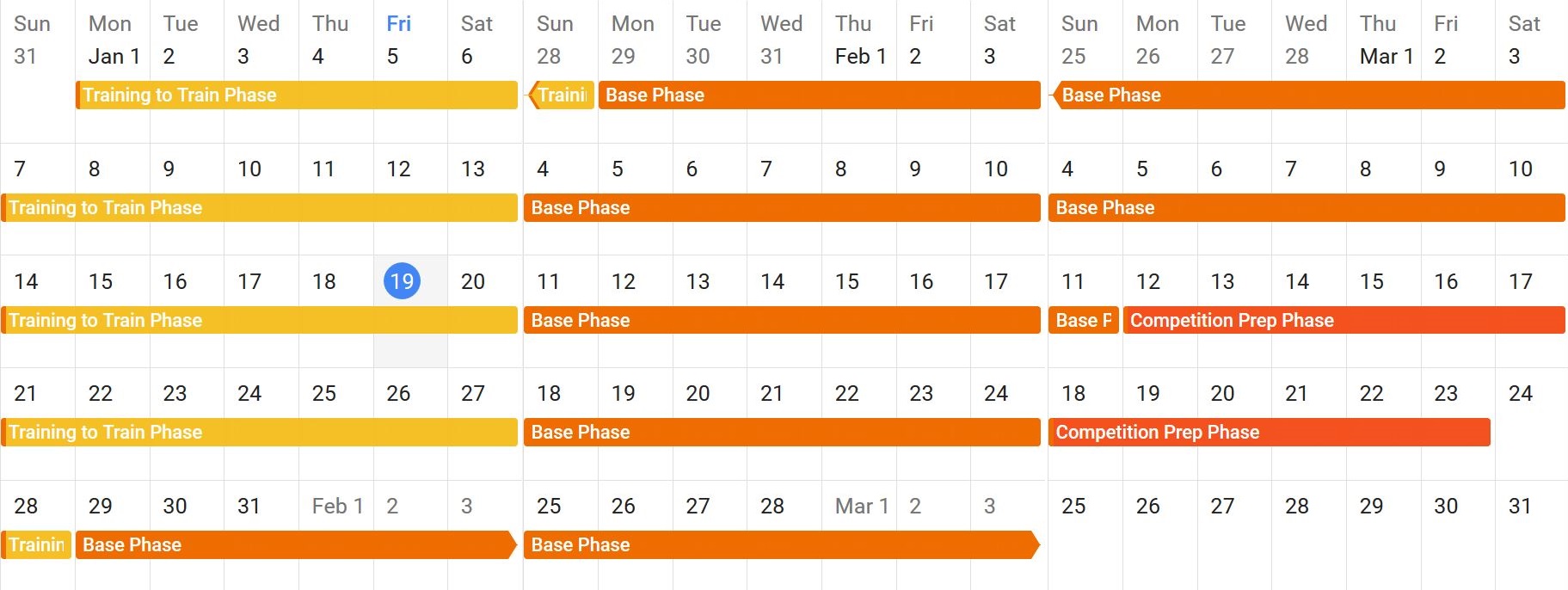Periodization could allow knowledge workers to prioritize their work more efficiently
We all have to balance different areas of our lives: work, hobbies, learning, health, fitness, relationships. Within each of these areas, there’s an infinite number of tasks we could do.
It’s overwhelming.
Sometimes we try to do too much at once and end up getting nothing done. Even if we’re great at eliminating the inessential, we still have a large number of actions to take. Trying to do too many new things at once actually reduces our chances of success [1].
The reductionist solution is to focus on one thing at a time. Or at least, focus mostly on one thing, while putting in just enough effort elsewhere to maintain the status quo.
To help us explore further, let’s introduce a few characters.
Knowledge Worker Joe

Knowledge Worker Joe works at a corporate office downtown. His goal is to get better at his job, so he can get a promotion. He has to balance planning, emails, meetings, research, organization, focused deep work, etc. All of these tasks should be supported by a foundation of sleep, nutrition, and health, but Joe is too busy to stay on top of these.
Joe must write a quarterly report, but his writing skills are abysmal. His last report was declared “unreadable” by his boss. To improve his writing skills, Joe must perform deliberate practice, but he spends all day reacting to urgent emails and can’t seem to make the time.
If Joe doesn’t change something, he will stagnate, his next quarterly report will be just as unreadable as the first, and he’ll be passed over for that promotion.
Olympic Weightlifter Dimitri

Olympic Weightlifter Dimitri lives at a training camp in Chekov, Russia. His goal is to lift the heaviest barbell at the Olympics. He has to balance endurance, body awareness, mobility, rigidity, hypertrophy, strength, technique, etc.
All of these tasks should be supported by a foundation of sleep, nutrition, and health. The training camp has a regimented sleep schedule, provides food, and physical therapists are available on-site. But even without the structure of the training camp, Dimitri would take care of his foundation habitually, without struggle.
At the last national meet, Dimitri did well, placing silver. Dimitri’s coach has pointed out a few weaknesses that are preventing a gold medal. To improve at his job, Dimitri must perform deliberate practice with the two Olympic Lifts. His training schedule is arranged so that there are weeks focused on deliberate practice with heavy weights.
If Dimitri keeps this up, he’s on his way to the Olympics.
Maybe Joe can learn something from Dimitri.
Periodization
How do professional weightlifters balance all aspects of training? Periodization.
Periodization is a method of organizing an athlete’s training to balance different aspects of performance. Instead of trying to improve everything at once, periods of time are dedicated mostly towards one aspect.
While there are dozens of factors that go into an athlete’s performance, we can group them roughly into three areas:
- General Physical Preparedness - General fitness and athleticism needed to perform the lifts and train heavy
- Strength Training - Raw strength of the larger muscle groups
- Technical Prep - Sport specific technique to perform the two Olympic lifts
Don’t fret, we’ll get back to knowledge work in a second.
A typical ~12-week training cycle looks something like this [*]:
- 1-4 weeks of ‘Training to Train Phase’ - General Physical Preparedness
- 5-8 weeks of ‘Base Phase’ - Strength Training
- 3-5 weeks of ‘Competition-prep Phase’ - Technical Prep
Why does this work? Focusing on too many aspects at once results in poor performance across the board. By splitting the focus amongst different time periods, multiple aspects can be developed without interfering with each other.
Additionally, maintaining a skill is easier than the initial effort needed to gain that skill. To improve endurance, Dimitri might have to jog 4 days a week. To maintain, a short jog once a week would suffice.
Note that there is a specific ordering to the different phases. Everything builds up to a final performance: the competition.
- ‘Training to Train’ builds a base of fitness to make sure an athlete can finish his…
- ‘Base Phase’, which builds the raw strength needed to…
- Lift heavy weights during ‘Competition-prep’, leading to…
- Maximal weights lifted at the competition
How can Joe learn from Dimitri?
Let’s transfer the concept of periodization to Joe’s office job. What does General Physical Preparedness, Strength Training, and Technical Prep look like for the office worker? How can we arrange knowledge work’s many aspects into a sequence of focused time periods?
The Knowledge Work Equivalent of General Physical Preparedness
Just like heavy weightlifting training requires a base of athleticism, knowledge work requires a base of fundamentals. The basic set of skills that set you up to be able to perform work at your best.
The major fundamental aspects are enough sleep, proper nutrition, and exercising on a regular basis. These all provide the body with enough energy to make it through a brutal day at the office.
These fundamentals are so simple, but provide an incredible boost in capacity. Yet we often overlook them, preferring to power through our low-energy day with excessive caffeine.
Us office workers also need to make sure our task, email, and organization systems are set up and in place. Even a minimalist system like a todo-list on a post-it note is more than many office workers implement.
Build the important fundamentals, make them habitual, entrain them, and make it easier to maintain them with little effort.
Knowledge Worker Joe is pretty new to using systems to get his work life in order, so he decides to spend 4 weeks in a ‘Training to Train Phase’.
First, he aims to improve his email work-flow. For this one month, he will go to bed by 11 pm and wake up by 7 am. For exercise, he decides to take 20 minutes out of his lunch break to go for a walk.
Joe still has to get his work done of course. He feared that spending too much time on these boring basics would mean he wouldn’t have enough time to finish his real work. But he quickly finds that making these few fundamentals a priority is giving him more time (from the improved email work-flow), and more energy (from the sleep and walking).
Towards the end of his 4 weeks, processing email, sleeping 8 hours, and walking every day has become just another part of his day. He’s ready to move on to a ‘Base phase’.
The knowledge work equivalent of Strength Training
Weightlifting: Dimitri’s ultimate goal is clear: lift heavier weights at a competition. The ‘base phase’ is spent building the strength needed to push his abilities during the next ‘Competition-prep’ phase. This is accomplished by doing a lot of training around 75-85% of Dimitri’s maximal ability.
Knowledge Work: If we have a huge project to ship or a big deadline to meet, our ultimate goal is clear. Our base phase will be spent building the skills and capacity we need to set us up for success in the next and final phase.
But for most knowledge workers, there are an infinite number of choices for an ultimate goal. What we mean by ‘strength’ becomes harder to pin down.
If we aren’t sure what to focus on for an end goal, we can choose a ‘Super Skill’–any skill with a virtually guaranteed return on investment regardless of profession. If you’re driven by deadlines, make one up, and commit to it.
Either way, what we choose as our ‘strength training’ must be derived from whatever end goal we choose.
Strength Training for knowledge workers generally means one or more of the following:
- Sitting down and actually doing the work
- Practicing the skill we want to improve
- Improving our ability to focus on work
- Building ability to work for longer periods of time (build capacity)
- Iterating and improving on work processes
- Organizing the resources/knowledge you need - making connections
Some Examples of Strength Training for Various Professions
- Writers: Writing Blog Posts and getting feedback from readers
- Entrepreneurs: Demoing MVPs to potential customers and getting feedback
- Marketers: Compiling resources and talent needed for an ad campaign
- Students: Reading, Cleaning up and reviewing lecture notes
- Engineers: Exploring design limitations and possible solutions
- CS: Planning and writing code
- Everyone: Finding Resources for learning a new skill, doing appropriate exercises
We want to work hard and build our capacity to do more, but not too hard. At this stage, working to our absolute maximum limits would lead to burn out.
During this phase, us knowledge workers still must take some time to make sure fundamentals are being maintained. Because we spent time in the last phase focused on developing these fundamentals, maintenance doesn’t take much effort.
Joe knows he needs to improve his writing skills. The next 6 weeks are going to be dedicated to writing practice. He finds a few guides for improved writing online and works through them.
Every time Joe sends an email or a short memo, he takes a few extra minutes to hone his skills. First, he makes an outline showing a logical progression. Then he writes, making sure each paragraph starts with a topic sentence presenting its main idea. He makes sure to use short, clear sentences. Before sending he takes the time to double check his spelling and grammar. [2]
Initially, it’s a huge pain in the butt for Joe, who has to respond to dozens of emails every day. He’s afraid that he’s wasting his time. But soon, fewer and fewer emails are coming his way. Previously, an email might spawn a huge back-and-forth thread lasting days. Now, Joe’s logical structuring and clear sentences are reducing confusion, and his coworkers don’t have to reply for clarification.
Joe is finding the process of writing, while still difficult, is getting a little easier. As the weeks go on responding to email changes from a pain in the butt to just another daily routine. Joe even volunteers to help a coworker with a tough report. Joe’s confidence is growing.
Meanwhile, Joe still gets 8 hours of sleep, walks every day, and gets his email inbox to zero with almost no effort. Maybe he misses the mark once in a while, but it’s no big deal and the next day he’s back on track.
The end of the quarter and the deadline for that report approaches…
The knowledge work equivalent of technical prep
Weightlifting: For Dimitri, the competition draws near. The amount of strength training drops and general fitness training drops to a bare minimum. More of the competition lifts are performed, and the weights get even heavier, closer to maximal. Dimitri is pushing the limits of his body, readying it for the extreme act of lifting extremely heavy weights.
Knowledge Work: With only a few weeks left, now is the time to redline our capabilities, and truly push our limits. If your ultimate goal has a deadline, this is where your big project gets shipped. If your ultimate goal is improving some sort of skill, this is where you test the boundaries of your capability.
Some Examples of technical Prep for Various Professions
- Writers: Publishing a book
- Entrepreneurs: Shipping a project
- Marketers: Launching an ad campaign
- Students: Studying for a big test
- Engineers: Finalizing a design
- CS: Launching v1.0
- Everyone: Finding the limits of your skill and pushing them
During this stage, some of your fundamentals might have to be sacrificed to meet a deadline or push things out the door. Finding the point of collapse is an important part of this whole process. You gain a better understanding of where your systems break down and know what to work on next time.
Joe’s Technical prep is delivering that quarterly report. It’s due in two weeks. Normally, Joe would be freaking out, worried that the report won’t get done. But Joe has spent the past 10 weeks prepping for this. His consistent sleep schedule and daily walks ensure energy remains high throughout the day. The improved email handling means Joe has more time to work on his report. Joe’s writing practice is starting to pay off; the report is coming together smoothly.
Joe is pushing his writing limitations. Since he started practicing writing, the quarterly report is by far the longest and most complicated document Joe’s had to work with. His outline takes a few days of revision before the report has a flowing, logical structure. The last week before the report is due, Joe’s systems start breaking down. His email inbox is starting to fill up a bit. Finding the information he needs proves to be challenging. One day Joe skips his lunchtime walk to generate a diagram for the report. Editing such a large document is taking longer than he thought, so Joe stays late Wednesday and Thursday, working until 10 pm.
Joe prints the report, gives it one last look-over, and, smiling, drops it on his manager’s desk.

After the ‘Competition’
Take some time to rest and relax. Take it easy. Consolidate your newfound gains. Clean up any orphaned tasks or small things that fell through the cracks.
Review the last 3 phases. What went well? What went okay? What areas broke down?
Start again, picking what actions to take based on how the last cycle went.
Joe’s boss is pleased with the report. It’s much clearer to read and will help clarify business decisions. There are a few minor mistakes, and some information is missing, but it’s a much more useful document than last quarter’s.
Joe looks back on the last 3 months. Next cycle, he’s going to improve his organization system, so finding information for the report takes less time.
Want to give periodization a try?
See if you can implement something like this in your personal or professional life. Pick a skill that you want to push forward. Figure out what fundamentals you need to entrain, what capacity you need to build, and where you can push your limits. Organize it into a ~12-week cycle, broken into periods of ‘Training to train’, ‘Base’, and ‘Competition-prep’ phases. Let me know how it goes.
I’m curious to see how other people are implementing this. I’ll help guide the first 3 readers who ask through an entire 12-week cycle, at no cost. Send me a message: james@jamesstuber.com or @uberstuber
Want to level up your productivity and start getting work done?
We built an interactive coach, available 24⁄7 to give you a feasible next step to improve your productivity skills.
Get the Digital Productivity Coach
Further Reading
- Roadmap for Training - Yasha Khan
- Roadmap for Training pt. 2 - Yasha Khan
- Trying to pursue many different directions at once? - Derek Sivers
- Monthly Theming - Sebastian Marshall
- Entrainment - Sebastian Marshall
- Minimalism Resources
- Work in Serial
- Dealing with Productivity Overwhelm
Sources
- [1] - Dalton, Spiller, ‘Too Much of a Good Thing: The Benefits of Implementation Intentions Depend on the Number of Goals’
- [2] - Pozen, ‘Extreme Productivity: Boost Your Results, Reduce Your Hours’, Ch. 8
*Sidenote: Why the variation in weeks for each training block?
A new lifter needs to focus more time on the fundamentals. Youth lifter Sally has only been weightlifting for one year. She might spend 4 weeks in the ‘Training to Train phase’ to develop general fitness. Sally wouldn’t be able to make it through a full 2 months of a ‘Base Phase’, she would be too worn out by the end of it, and not ready to move into a ‘Competition-prep phase’.
Professional lifters like Dimitri have been lifting for a decade or more. Their fundamentals remain strong even with only minor maintenance. Therefore they might only spend 1 week in ‘Training to Train’. Dimitri needs a longer ‘Base Phase’ to develop strength; he has been training so long that getting tiny performance improvements requires more and more training. He might spend 2 or even 3 full months in a base phase (lengthening the entire training cycle)
Similarly, Knowledge Worker Joe, who has never had a regular sleep schedule, might need to spend more time on the fundamentals. The extra time spent focusing on his sleep schedule ensures the activity will become habitual, and easy to maintain during the next period.
Knowledge Worker Sally used to have a consistent sleep schedule, but recently a big project has forced a few late nights. After the project ships, she might only need a week to get back into a regular sleeping pattern.
